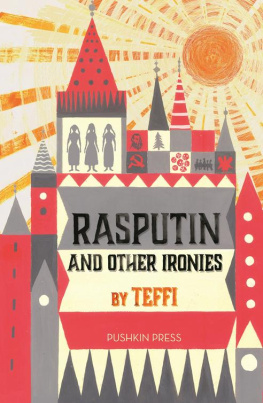Teffi
MEMORIES
FROM MOSCOW TO THE BLACK SEA
Translated from the Russian by
Robert and Elizabeth Chandler,
Anne Marie Jackson, and Irina Steinberg
Introduction by
Edythe Haber
BEFORE A MAP OF RUSSIAIn a strange house, in a faraway land,
her portrait hangs on the wall;
she herself is dying like a beggar woman,
lying on straw, in pain that cant be told.
But here she looks as she always did look:
young, rich, and draped
in that luxurious green cloak
in which she was always portrayed.
I gaze at your countenance as if at an icon
Blessed be your name, slaughtered Rus!
I quietly touch your cloak with one hand;
and with that same hand make the sign of the cross.
TEFFI
translated by Robert ChandlerTEFFI, commenting in 1918 on the savage civil war that was decimating the Russian Empire in the wake of the October 1917 Revolution, put the blame squarely on the devil. Russia had improbably held together for so many centuries, she wrote:
But suddenly some wily devil poked his stick somewhere near Moscow and began spinning Russia like a whirlwind top. Whee-ee-ee! The pieces are flying in various directions like sparks. The Crimea! The Caucasus! Poland! Little Russia! Lithuania! Finland! The Baltic region! Siberia! Kazan! Whee-ee-ee! More! More! Cities! Seas! Kingdoms! Principalities! Free lands! More! More! Soon only the stick will remain
Teffi was at the time one of the most widely read and beloved of Russias writers. As one migr commenter asserted: There was scarcely ever another writer in Russia who had such an enormous circle of readers as Teffi. He added that, although she published almost exclusively in the liberal press, both Russias read her and she was a favorite of the last tsar, Nikolai II (as she was of his Bolshevik successor, Vladimir Lenin). Her celebrity reached such heights that there even existed Teffi Perfume and Teffi Candies.
Teffi (pseudonym of Nadezhda Alexandrovna Lokhvitskaya) was born in 1872 into a distinguished St. Petersburg family. Her father, Alexander Lokhvitsky, was a professor of law and much published writer both in the academic and popular press, who, after the legal reforms of Tsar Alexander II in the 1860s, became a celebrated criminal lawyer. Teffi noted that he was renowned for his wita gift inherited by his daughter.and no less than four of the sisters became professional writers. One of them, Mirra Lokhvitskaya, achieved renown as a poet before her early death in 1905. Known as the Russian Sappho, she introduced unbridled female sexuality into Russian poetry and had close ties to the decadents and Symbolists. The only boy, Nikolai, pursued a military career and during World War I led the Russian expeditionary force to France, rising to the rank of lieutenant general.
Teffis own writing career was delayed by her short and unhappy marriage to Wladyslav Buczynski, a Polish graduate of the St. Petersburg Law School and a landowner. They wed around 1890 and separated less than a decade later when Teffi abandoned her family at her husbands estate in the Mogilev Province (now in Belarus) and returned to St. Petersburg to pursue her literary calling. In 1901 her first publicationa serious poem that she herself judged dreadfulappeared under her maiden name, N. Lokhvitskaya. For the next couple of years she signed her serious work with her real nameusually her married name, N. Buchinskayaand her humorous pieces Teffi, but by 1904 she used her pseudonym exclusively.
By 1903 Teffi was reaching a broader audience, her feuilletons, stories, and verse (both satiric and serious) appearing regularly in the popular Petersburg newspaper, Birzhevye vedomosti (The Stock Exchange Gazette), as well as in other broad circulation newspapers and magazines. In 1907 her activities spread to the theater when her one-act play, The Woman Question, was successfully staged at St. Petersburgs Suvorin Theater. It was followed by many more theatrical miniatures, which enjoyed great popularity over the next decade in St. Petersburg, Moscow, and throughout the Russian Empire. In addition, Teffis talents extended to music. She wrote many songssometimes both words and music, at other times only the lyrics. These she sang to the accompaniment of her guitar (which she tenderly eulogizes in Memories) and many became part of the repertoire of well-known performers.
It has been said that Teffi invented her own genrethe feuilleton that got by without politics
In the first issue of Novaia zhizn, Teffis sketch, October 18, vividly depictsusing visual iconography common in revolutionary artthe masses united in a mighty and triumphant procession, their red banners outlined against the sky like gigantic dark streams of resurrected triumphant blood.
Between 1906 and 1908 Teffis political satire continued to appear in other opposition periodicals, but with time it grew milder, due in part to greater government restrictions, but also, no doubt, to fading revolutionary fervor. Russia was tired of all that solemnity, she wrote in 1910, and was longing for laughter:
Laughter is now in style [] Books of humor go through three editions in three or four months and demand for them keeps rising. Humor magazines are alluded to even in speeches delivered under the bell of the State Duma. Theatrical entrepreneurs are longing for a good merry comedy and beg tearfully, Why, write something, the kind of thing that makes your throat begin to tickle with laughter!
The demand for laughter coincided perfectly with Teffis special gift, and it accounts for the renown she achieved during her final decade in Russia. The first print organ that spread her fame was Satirikon (Satyricon), the best Russian humor magazine of the early twentieth century, conceived of in 1908 by Arkady Averchenko (who in Memories is Teffis traveling companion from Moscow to Kiev). With its very talented staff of writers and artists, Satirikon was a resounding success, and Teffi and Averchenko became its most celebrated writers. Her popularity grew still greater in 1909 when she became a feuilletonist for the Moscow-based Russkoe slovo (Russian Word), the most widely read and highly regarded newspaper in Russia, whose circulation reached over a million by 1917. Her Sunday columnswhich included both topical feuilletons and storiesappeared in Russkoe slovo until it was closed by the Bolsheviks in 1917.
Teffi published her first books in 1910, and they reflect the two sides of her talent. The first, Seven Fires, is a volume of poetry plus a play written in orientalized prose; the second was entitled Humorous Stories.
During the revolutionary year of 1917, political events began again to figure centrally in Teffis stories and feuilletons. Exultation over the February Revolution and the overthrow of the monarchy is reflected in the story The Average Man, whose title character is now able to shout fearlessly the policeman is a fool. He explains to his wife: I felt like it and I screamed. Thats the way I am. I! The free citizen Gerasim Ivanych Shchurkin.
Teffis revolutionary sympathies, however, emphatically did not extend to the Bolsheviks. Her disdain for Lenin and his party, which dated back to 1905, is expressed powerfully in a feuilleton of late June 1917, in which she gave a withering portrait of Lenin: Average height, gray complexion, completely ordinary. Only his forehead is not good, very prominent, stubborn, heavy, not inspired, not seeking, not creative. The sincere and honest preacher of the great religion of socialism (as she rather surprising calls him) lacks the fiery tongue of the gift of the Holy Spirit, there is no inspiration in him, no flight, and no fire. For Lenins followers she expressed unadulterated contempt, but at once makes clear that she has not rejected socialism as such: Leninists, Bolsheviks, anarchists and communists, thugs, registered housebreakerswhat a muddle! What a Satanic vinaigrette! What immense workto raise once more and cleanse from all this garbage the great idea of socialism!













